Article Overview: List of the Pros & Cons of Living in New Orleans
Thinking about moving to New Orleans? You’ve come to the right place.
I’ve lived in The Big Easy for 7 years and have definitely learned a thing or two about living in New Orleans, Louisiana.
Home to a population of nearly 377,000 residents, it’s safe to say that living in New Orleans is a lively affair.
A city best known for Creole cuisine, great music and a never-ending party scene, there’s so much to love (and not) about calling this city home.
But I don’t want to get ahead of myself, so let’s cover everything you need to know about moving to New Orleans based on firsthand experience. Don’t hesitate to reach out with questions, I’m here to help!
Editor’s Note: As long time readers of this website know, the fun lives in the comments. Don’t forget to take a look below to see what other locals are saying. We update this post regularly based on feedback received. Cheers!
About my experience living in New Orleans
My name is Mike, pleasure to meet you.
I ended up moving to New Orleans with my fiance (Claire) in 2015 for a job opportunity. After one year of living in New Orleans we decided to buy a condo and settle in long term.
A lot has changed in our lives in the past 7 years (we added two kids to the mix), but I’m happy to report that we’re still enjoy our daily life in New Orleans. So without further ado, let’s roundup my personal list of pros and cons of living in New Orleans.
Living in New Orleans, Louisiana
Planning to visit before finalizing your decision to move to New Orleans? Here’s the hotel I recommend most.
First, the Perks of Moving to New Orleans
#1. The Knock-Out Food Scene
I’d like to kick off this list with a personal favorite, the epic food scene! I moved to Nola from New York City where the food scene is considered one of the best in the country, so my expectations for New Orleans were low.
Amateur mistake.
I had no idea that New Orleans is considered one of the best foodie cities in the country, but I can tell you it definitely lives up to the hype.
The name of the game is mouthwatering (and rib-sticking) Creole cuisine. Creole cuisine is a fusion of European, African and pre-Columbian American cuisine styles. Think seafood heavy dishes like crawfish boils, gumbo and Shrimp Ettouffee.
Apart from the meaty main courses, living in New Orleans is guaranteed to satisfy even the most stubborn sweet-tooth. You’ll find warm soft beignets (try them at Cafe Du Monde) and delectable Italian deserts at Angelo Brocato. It’s safe to say that you’ll never go hungry while living in New Orleans.
#2. Friendly Locals
Another thing that surprised me about moving to New Orleans was the friendliness of the locals. By and large, I’ve found it pretty easy to make friends while living in New Orleans.
I guess this is on par with Southern hospitality, but New Orleans is considered one of the friendliest cities in the country.
Granted, the city is usually buzzing with happy (and boozy) tourists, especially during Mardi Gras — but the friendliness lasts long after peak tourism comes to an end.
The city is a magnet for creatives, which makes living in New Orleans is a culture in and of itself. It’s unlike any other place in the country and locals take pride in calling the city home. There’s a true sense of community, where people look out for each other.
#3. Great Live Music
I’m ashamed to admit that I didn’t know New Orleans was the birthplace of jazz before moving to Nola.
If you love music (all types of music, not just jazz) you’ll be spoiled for choice while living in New Orleans. In fact, NOLA is the 6th best city in the country for live music.
Most popular bands and musicians pop into New Orleans while embarking on world tours and for good reason.
But you don’t even need to go to a venue to catch some tunes. You’re practically guaranteed to hear music while walking down the street day or night. I’ve lost count of the number of times I’ve heard super talented street performers that had me do a double-take.
I will admit, prior to moving to New Orleans I didn’t appreciate jazz. It took about a year for me to settle into the style — largely thanks to my coworkers who kept inviting me to various clubs around town. And now? Well, I’m hooked.
If you have any specific music spots you recommend drop them in the comments below and I’ll update the post!
#4. The (Relatively) Low Cost of Living in New Orleans
One of the biggest reasons my wife and I plan on living in New Orleans long-term is the affordability. I know that most places in America aren’t affordable and I wouldn’t flat out call New Orleans “affordable” but it’s all relative, right?
A ton of people fled the city after Hurricane Katrina, which substantially brought down the cost of living in New Orleans. 15+ years later and I’d say the city is still going through growing pains, which is why it’s more affordable than most US cities.
But don’t just take my word for it, The Big Easy is considered one of the most affordable big cities in the country.
#5. Festivals Galore
I was talking with a coworker last week and she mentioned that she’d never leave the city because of the plethora of festivals and events going on any given weekend. I never really thought about that, but after mulling it over, I can’t say I disagree.
Living in New Orleans is truly an experience because of how lively the city feels (it’s a fun place to live!). There’s always something going on. I mean, just look at all the festivals we have.
You’ll find a festival for every occasion, which is why the city attracts party animals from all corners of the country. I’m partial to the oyster festival (I’m serious, it’s held in May) and the French Market Creole Tomato Festival (still serious, this one is held in July).
Learn About Mardi Gras Before Moving to New Orleans
The granddaddy of all festivals in Mardi Gras, which runs from January 6 to Ash Wednesday. However, the greatest celebration falls on the day before Ash Wednesday (February 21, 2023). Fitting, considering that Mardi Graw is French for “Fat Tuesday” and refers to the practice of gorging on fatty foods before the start of lent.
Watch the city streets come alive with art, music and festivals galore during this two month stretch. From storied traditions of king cake and bead tossing to festive costumes and floats that span the gamut.
This is a marathon, not a sprint. Every event builds anticipation as the calendar ticks closer to Ash Wednesday.
#6. The Slow Way of Life in New Orleans
Within a year of moving to New Orleans my wife and I realized how much we enjoyed the slow place of daily life. People aren’t running around like they’re late for everything. Generally speaking, I think people are less stressed in around here (myself included).
But don’t just take my word for it, According to WalletHub, New Orleans is considered the 7th least stressed city in the country. Since moving to New Orleans, I found that conversations last longer, meals take more time and lingering outside with a beverage in hand is par for the course. It’s almost like being on vacation, which isn’t something I realized before the move.
#7. Drinking on the Street is Legal
So this might seem like a little thing, but it’s a huge perk for me so I thought I’d mention it. I love that I can (legally) drink on the street while living in New Orleans. The catch? The libation can’t be in a glass container, which isn’t a problem.
Joining a handful of cities, New Orleans is one of very few places where people can publicly drink in the street. There’s something so cool about hanging out with friends, grabbing a beer to go and wandering around the street until you land at your next destination. It’s something I take for granted until visiting another city.
In addition to relaxed drinking laws, I also love that the local bars stay open much later than other places I’ve lived. Living in New Orleans doesn’t feel like living a retirement community by any stretch of the imagination.
#8. Interesting Architecture
Heavily influenced by French, Caribbean, Greek Revival, and Spanish Colonial architecture styles, is anyone surprised to see Crescent City dubbed a top destination for architecture lovers?
If you want to experience the beautiful buildings for yourself, make a beeline for the French Quarter where charming Creole townhouses take center stage. These buildings are a mix of brick and stucco that come equipped with cast-iron balconies and parapeted roofs.
Indeed, the fascinating architecture is definitely one of the coolest things about living in New Orleans. Admittedly, it’s hard to describe the importance of finding your city beautiful, but it adds so much pride and joy to daily life.
Walking the city streets is downright enjoyable because there’s no shortage of interesting buildings admire. Plus, it’s always fun to see out-of-town guests react to the architecture (make sure you have some fun historic or architecture facts up your sleeve).
Local’s Tip: If you’re moving to New Orleans with the intention of getting to know more about the architecture, start by touring the St. Louis Cathedral. This is the oldest cathedral in the country and has the beauty to prove it. This is my favorite place to take out of town visitors.
But word of caution, if you’re moving to New Orleans with the hopes of buying a charming 200+ year old home, understand the cost of the upkeep. I’ve heard a few horror stories revolving around sticker shock, maintaining an old home won’t come cheap.
#9. Access to City Park
Spanning an impressive 1,300 acres, City Park is the crown jewel of New Orleans. Home to beautiful lagoons and old-growth trees (some up to 900 years old!), daily access to this park is one of the best things about living in New Orleans.
In addition to providing a peaceful respite, the park has no shortage of interesting cultural institutions as well. Meander the paths in search of the New Orleans Botanical Garden or the epic New Orleans Museum of Art to get your fill of impressive works.
City Park is a masterpiece and I’m not the only one that thinks so, it’s considered one of the 10 best parks in the country by USA Today.
Cons of Moving to New Orleans
#1. The Poor Job Market
No honest list of the pros and cons of living in New Orleans would be complete without mentioning the abysmal job market.
Frankly, the economy is not that great and most jobs tend to be low paying/low skilled. Tourism is the lifeline of New Orleans, so it makes sense that most jobs tend to be in the service industry.
But still, there’s something disheartening about the city’s top employers catering to the service and hospitality sectors rather than innovative pursuits like the technology and bio science industry.
High skilled (read: high paying) jobs are very hard to come by, and growing your career (if you land a good gig) is even harder. Competition is steep, and it’s not like you can easily jump from one employer to the next when there aren’t very many employers to begin with.
Put another way: New Orleans is the largest city in Louisiana, making it the epicenter for job opportunities. But Louisiana is considered the 4th-worst state in the country for job availability. All told, don’t plan on moving to New Orleans unless you have a great job lined up.
#2. The Heat and Humidity is a Bear
Let’s say you find a great gig and end up moving to New Orleans after all, congratulations! You’ll love living in New Orleans most of the year with the exception of the summer month.
If Dante’s inferno ever needs a new addition, summer in New Orleans would be the top contender.
The thing you need to understand about living in New Orleans is that we only have two seasons – super hot months and cooler months. Spring and fall are non-existent, but the summer months are more than memorable, especially during those infamous hot spells.
From June through August you can expect daily highs in the mid-90s and humidity levels clocking in around 70-80%. I won’t sugarcoat it, summers make living in New Orleans hellish at times.
The unrelenting humidity can be chocked up to our rainy season, which occurs in the summer months. This concoction of intense humidity and heat makes sense when considering the fact that New Orleans is located in a prime hurricane zone (I’ll cover this shortly).
Facts aside, summer is by far my least favorite season (and I doubt I’m the only local that thinks so).
#3. Terrible Public Education
Here’s another heavy hitter to consider for those moving to New Orleans with young children: the public schools leave much to be desired.
Louisiana often claims dibs to having some of the worst public education programs in the country. As you know, education is vital to a child’s success. And, as much as I hate to say this: The public schools in Louisiana are cause for alarm.
After researching stats and metrics, we determined that private school was the only route to go. This really sucked for us because we didn’t plan on the expense before moving to New Orleans. But it wasn’t until we had our first child that we realized just how poorly Louisiana ranks for education.
So word of advice from a fellow parent — budget private education into the cost of living in New Orleans if you’re moving here with kids (or plan to start a family soon).
Help a Local Out: If you sent your kid to private (or public) school and loved the education received, let other readers know in the comments below. Speaking from persona experience, finding a school was very stressful for my wife and I. I’d love to hear from those that are happy with the schools their kids went to while living in New Orleans.
#4. High Crime Rates
I’ll be blunt on this: New Orleans has some of the highest crime rates in the country. After living in New Orleans for 7 years, I’m happy to report that we don’t fear for our safety by any stretch of the imagination, but we’ve both experienced petty crime on one or two occasions.
However, both of us have had coworkers call out of work because their cars were stolen. Likewise, an acquaintance of mine was robbed at gunpoint while walking out of a bar at 2am (just off Bourbon Street).
It seems like the French Quarter is the hot spot for robberies because that’s where all the action is (tipsy tourists, mostly).
As mentioned, I can honestly say that I’ve never personally felt unsafe exploring the French Quarter (or living in New Orleans in general), but you need to be on guard during huge celebrations and the late night hours.
My honest advice? You don’t need a car while living in New Orleans and the headache of owning a car isn’t worthwhile. What’s more, Louisiana has the second-highest car insurance rates in the country.
#5. The Bugs Will Eat You Alive
Alight, not literally. But some days you wish it were “literally.”
When it comes to daily life in New Orleans, the hardest adjustment for those that didn’t grow up in the south is getting used to the pestering bugs.
If you’re from the west coast, allow me to fill you in: Learning to co-exist with critters is not unique to daily life in New Orleans. Heck – it’s a rite of passage in the south. But I’ll tell you what, it doesn’t make living with the damn things any easier.
The largest culprit is the brown recluse spider. This is one of the most dangerous spiders in America and one that takes great pride hiding in every crevice imaginable.
It’s like a real-life version of Elf on the Shelf, only this thing is playing for its life. Long gone are the days of not having to inspect your shoes before putting them on. No, that luxury is foregone by those that move to New Orleans.
If you get bit by a brown recluse spider and start experiencing dizziness, vomiting or chills, you need to seek medical attention immediately.
Apart from the brown recluse, you may get acquainted with the notoriously bitter fire ant after moving to New Orleans. While fire ants won’t force you to seek medical attention, they will wreck havoc and pain worse than that one ex-girlfriend you had in high school.
Nobody forgets the first time they were bit by a fire ant. The ensuing dread (and damn betrayal) stay with you for life. I guess, in a lot of ways, that’s something the fire ant and ex have in common though.
#6. The Failing Infrastructure
Moving on from deadly critters, let’s talk about the thing locals gripe about most: the failing infrastructure.
It’s hard to know where to begin, so let me give you a quick roundup of the biggest complaints I’ve heard while living in New Orleans.
First, the roads are in terrible conditions, potholes are an icon for the city. Second, I swear those water pumps fail whenever heavy rainfall occurs (which is often). And finally, the outdated sewage system wreaks havoc on a weekly basis.
Making matters worse, it doesn’t help that The Big Easy is the most populous US city located under sea level.
I think what bothers me most about the failing infrastructure is how officials try to bill this as a test of resiliency. “We’re stronger than the potholes.”
I’ve lost count of the number of times I’ve seen residents get billed as “resilient” because they got through another flooding, etc. It’s tiresome.
Hell, I don’t want a gold medal for surviving daily life in New Orleans.
Failing infrastructure requires long-term fixes and adequate funding. I’ve spent a lot of time reading up on the extent of the city’s failing infrastructure, and suggest you do the same before moving to New Orleans.
#7. Flooding & Hurricanes
Lastly, I’d like to mention one of the toughest things about living in New Orleans, the extreme weather conditions. There have been many days where I’ve anticipated a serious storm to hit the city and can’t begin to describe the ensuring street.
In fact, I sometimes catch myself walking around with a feeling of dread, like the other shoe is about to drop. I understand that this is a very unhealthy way to live, but when you thing about it, New Orleans made international headlines for Hurricane Katrina.
Hurricane Katrina tore through New Orleans in 2005 and caused $160 Billion in damage (making it the costliest hurricane on record). More than 1,800 people died and millions were left homeless (my aunt included, she ended up moving out of New Orleans after the disaster).
As such, many locals that lived through Hurricane Katrina have a tendency to brace for the worst when it comes to extreme weather conditions. But how can you blame them?
You’ll learn quickly after moving to New Orleans that floods are not unusual events (hurricane season runs from June to November). Many homeowners are required to purchase flood insurance for that very reason. The sub-tropical climate is no joke, and something you should brace for while living in New Orleans.
Retiring in New Orleans FAQ
Is New Orleans a good place to live?
Living in New Orleans is a very personal decision because, unlike some US cities, it’s a place of absolutes. New Orleans is well suited for extroverts that plan to take advantage of the city’s epic nightlife, great music scene and endless roster of festivals.
A lot of people enjoy living in New Orleans because of the city’s uniqueness and sense of community. However, those that don’t plan to take advantage of the nightlife and party scene may find themselves wanting for more. This is city that runs on parties and alcohol, and if that’s not your vibe, you may want to consider living elsewhere.
Is New Orleans a good place to retire?
Those planning on retiring in New Orleans should do proper research. The city’s rich culture, great food scene and youthful vibe is appealing to those that love to be in on the action. Likewise, the cost of living in New Orleans is relatively low compared to other major cities, which is great retirees on a fixed income.
But, it’s important to consider the demanding humidity and hot climate before retiring in New Orleans. Plus, the risk of flooding and hurricanes and high crime rate is cause for concern for retirees.
Is marijuana legal in New Orleans?
The short answer is no, recreational marijuana is not legal in New Orleans. However, as of 2021, marijuana possession in small amounts (14 grams or less) has been decriminalized in New Orleans.
In regular people talk, those found with small amounts of marijuana will not be subject to arrest, but will get fined.
Possession of larger amounts of marijuana, or the intent to distribute, is still considered a criminal offense in New Orleans. Medical marijuana is legal and the state has a program for qualified patients. However, the program has been slow to get off the ground and it is difficult for patients to access medical marijuana.
After living in New Orleans for 7+ years, I can confirm that the best neighborhoods in New Orleans are: The French Quarter, Garden District, Marigny & Bywater, Uptown, Mid-City and Lakeview.
The cost of living in New Orleans is generally low. According to the Council for Community and Economic Research, the overall cost of living index in New Orleans is lower than the national average by about 10%.
As of 2023, the median home price in New Orleans is around $345,000 which is considerably lower than the national median home price, which is currently around $428,000.
I’d be lying if I said yes. New Orleans has a relatively high tax burden compared to other US cities. The state of Louisiana has relatively high sales taxes and property taxes, and the city of New Orleans imposes additional taxes on top of these. For example, the sales tax clocks in at a steep 10%, which is higher than the national average of 7%.
Pros & Cons of Living in New Orleans, Louisiana (Post Summary)
In sum, here’s a roundup of the pros and cons of living in New Orleans, Louisiana.
- Knock-out food scene
- Friendly locals
- Great live music
- Festivals galore
- A slower way of life
- You can drink on the street
- The interesting Architecture makes living in New Orleans a joy
- New Orleans is home to one of the best parks in the country
- Poor job market
- The heat and humidity is a bear
- Terrible education system
- High crime rates are troublesome
- The bugs will eat you alive
- Failing infrastructure
- Extreme weather conditions are a consideration when moving to New Orleans
Compare the Pros & Cons of Living in New Orleans
| PROS | CONS |
|---|---|
| Knock-out food scene | Poor job market |
| Friendly locals | The heat and humidity is a bear |
| Great live music | Terrible education system |
| Festivals galore | High crime rates are troublesome |
| A slower way of life | The bugs will eat you alive |
| You can drink on the street | Failing infrastructure |
| The interesting Architecture makes living in New Orleans a joy | Extreme weather conditions are a consideration when moving to New Orleans |
| New Orleans is home to one of the best parks in the country. |
Pins | Moving to New Orleans
Helpful Related Articles
Living in Louisiana: 15 Honest Pros & Cons of Living in Louisiana
Living in Arkansas: 15 Honest Pros & Cons of Living in Arkansas
Living in Mississippi: 15 Honest Pros & Cons of Living in Mississippi
Living in Oklahoma: 15 Honest Pros & Cons of Living in Oklahoma
Living in Texas: 15 Honest Pros & Cons of Living in Texas
Living in Tennessee: 15 Honest Pros & Cons of Living in Tennessee
Living in Alabama: 15 Honest Pros & Cons of Living in Alabama
Living in Kentucky: 15 Honest Pros & Cons of Living in Kentucky
Living in Georgia: 15 Honest Pros & Cons of Living in Georgia
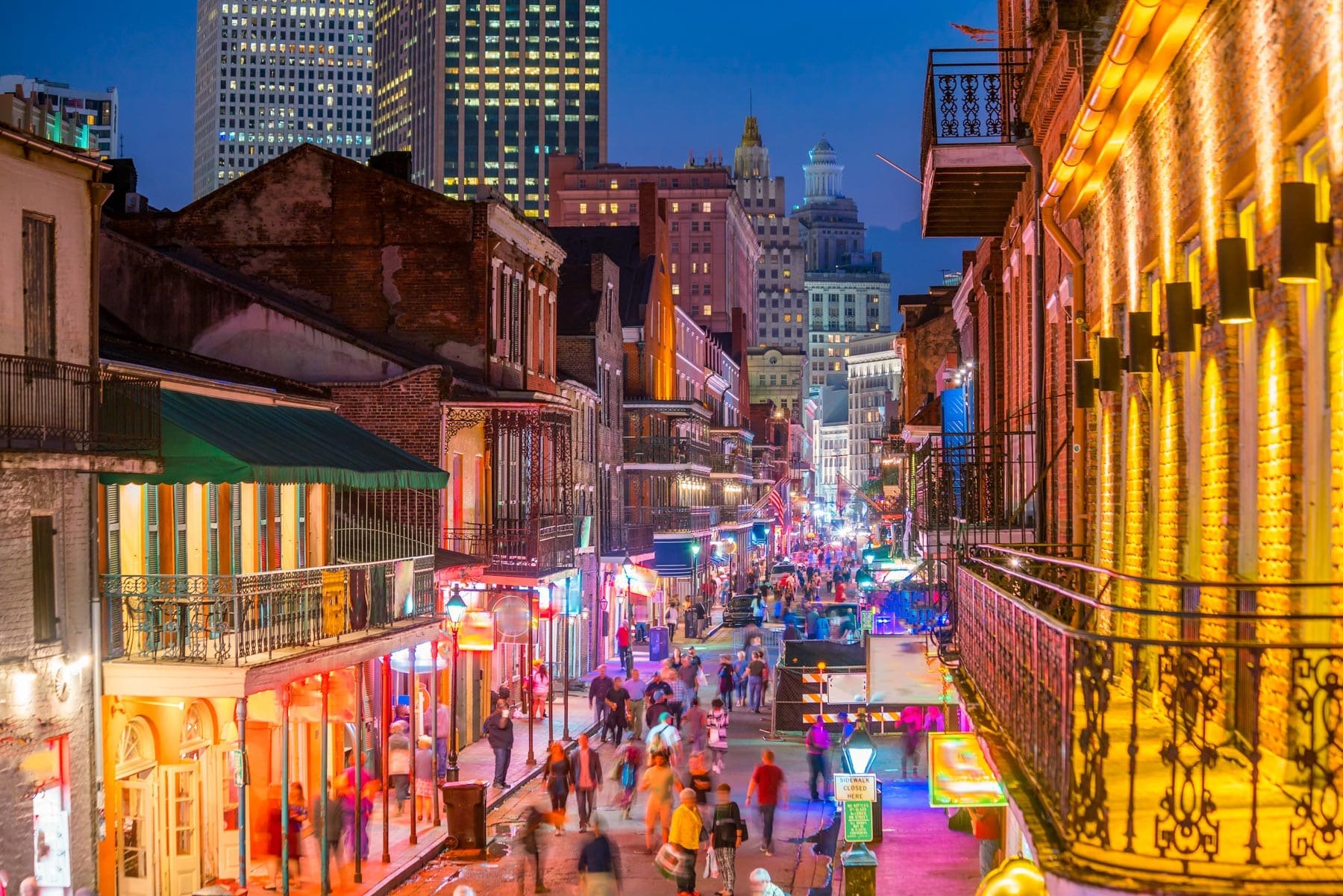
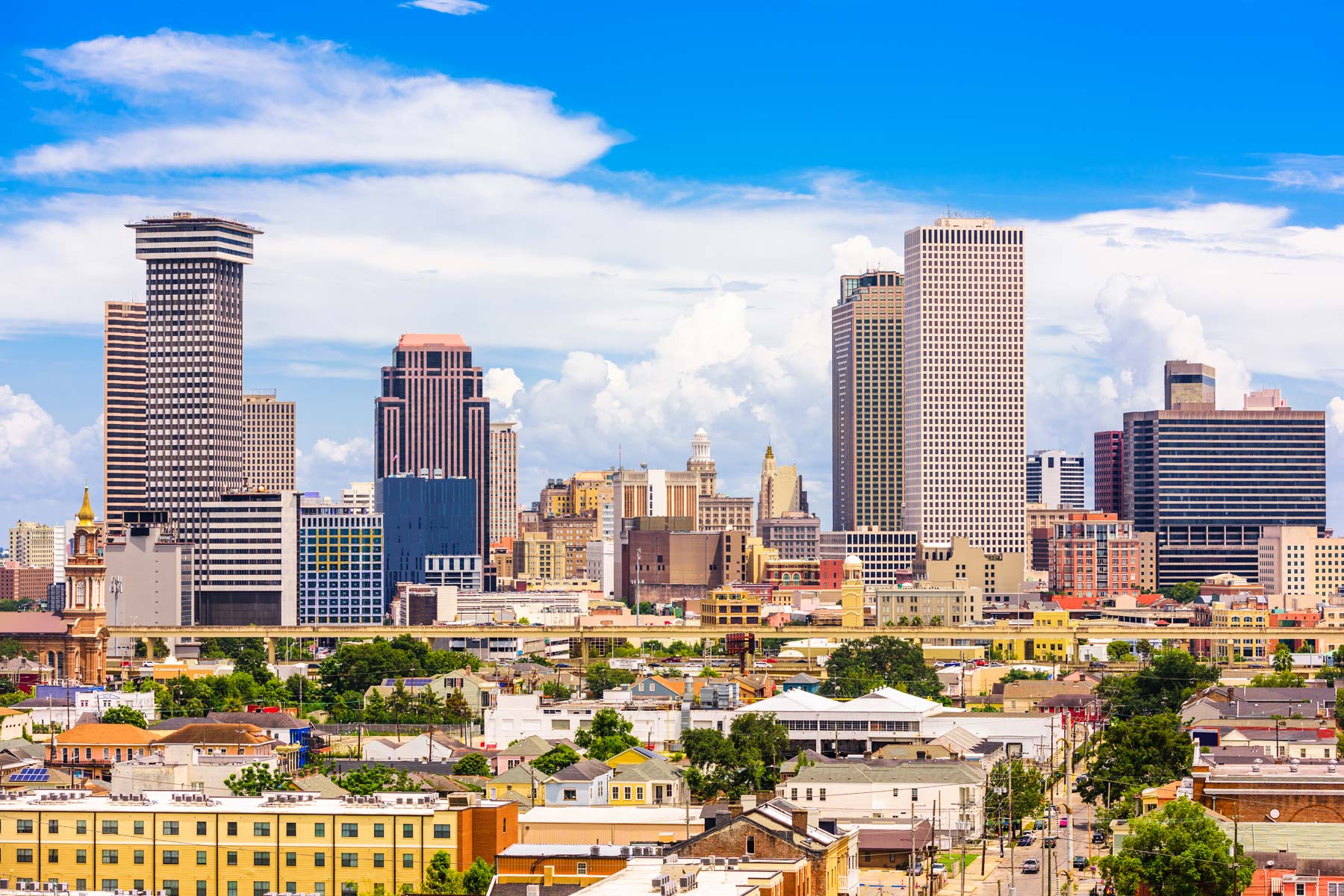

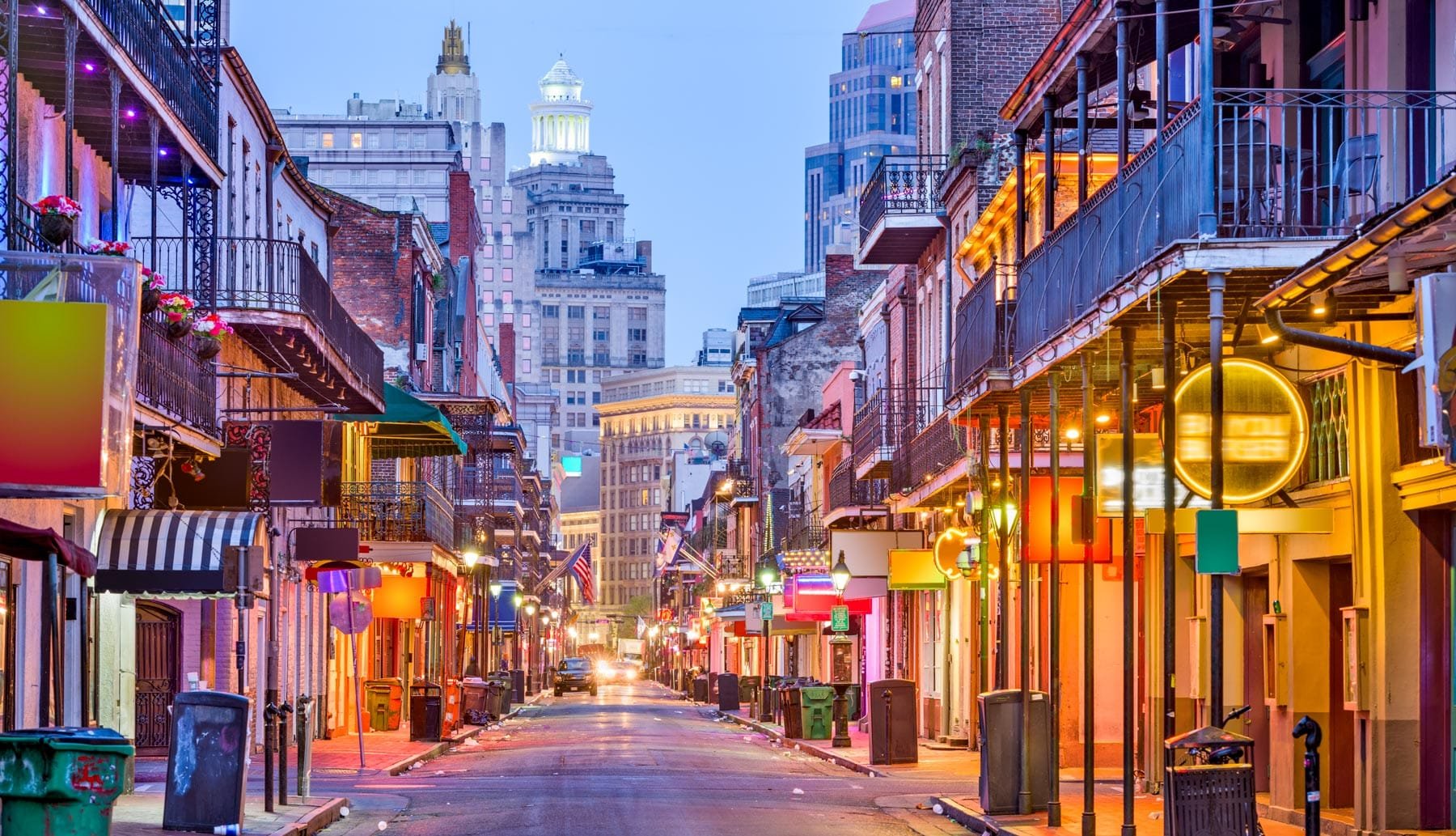
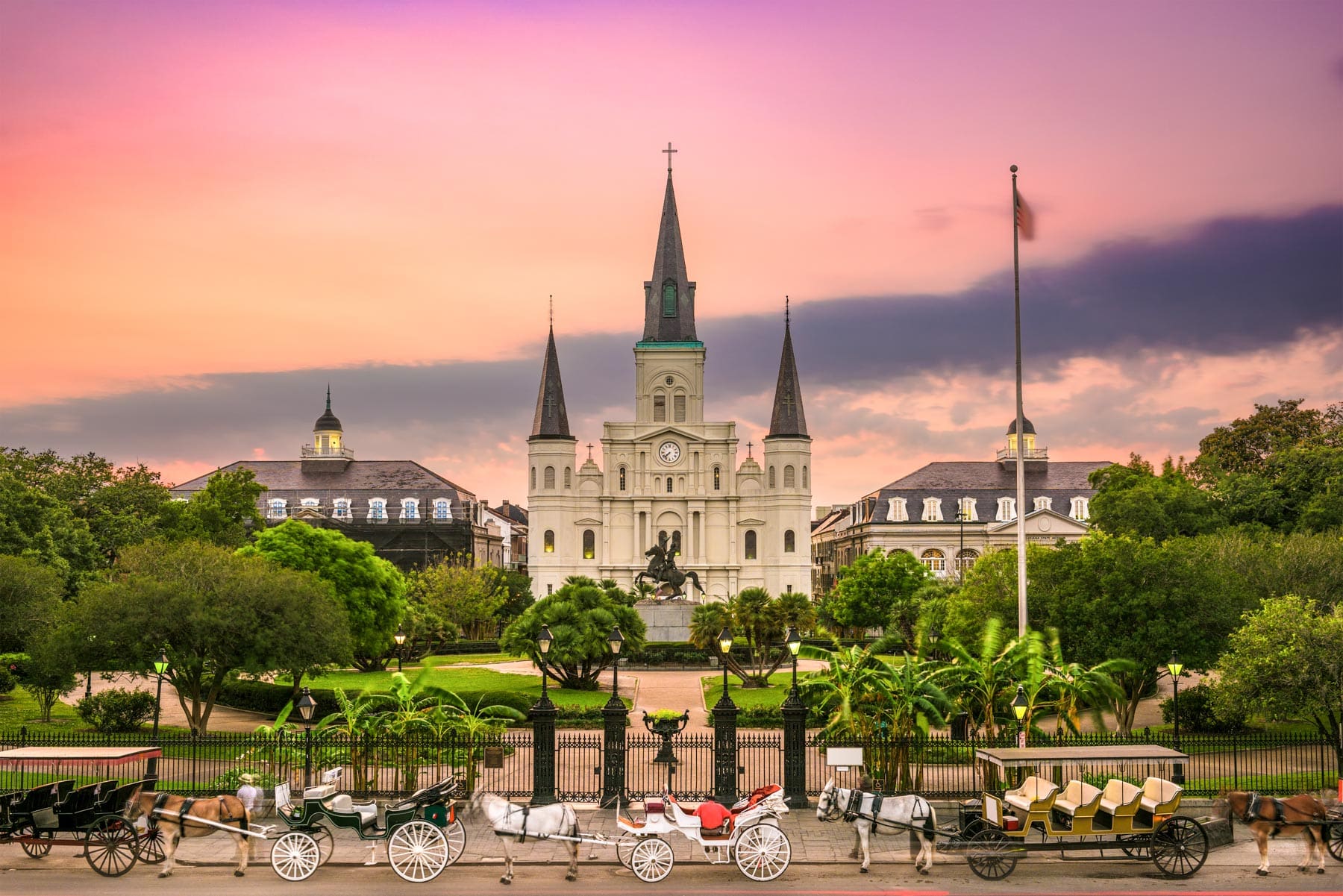
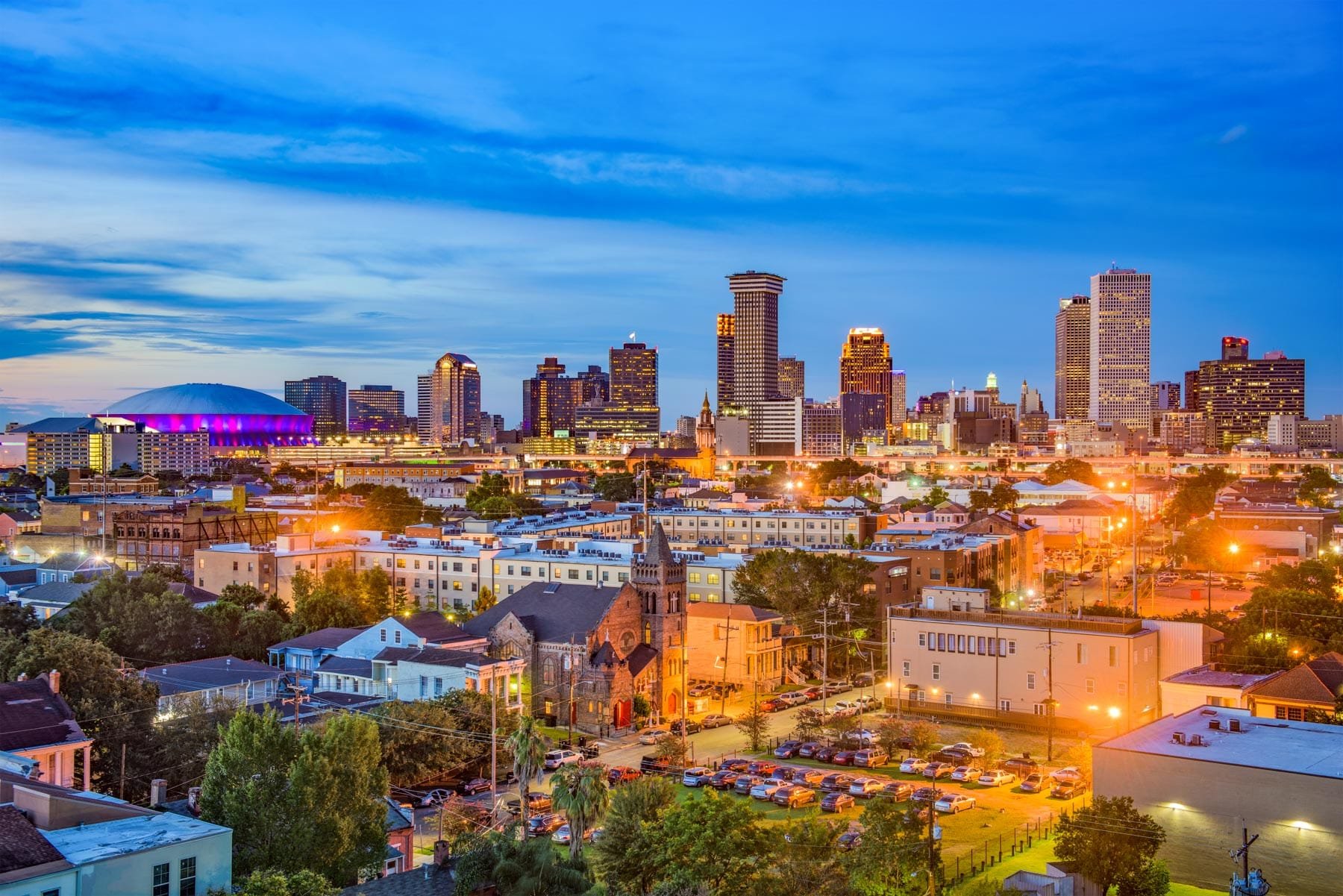
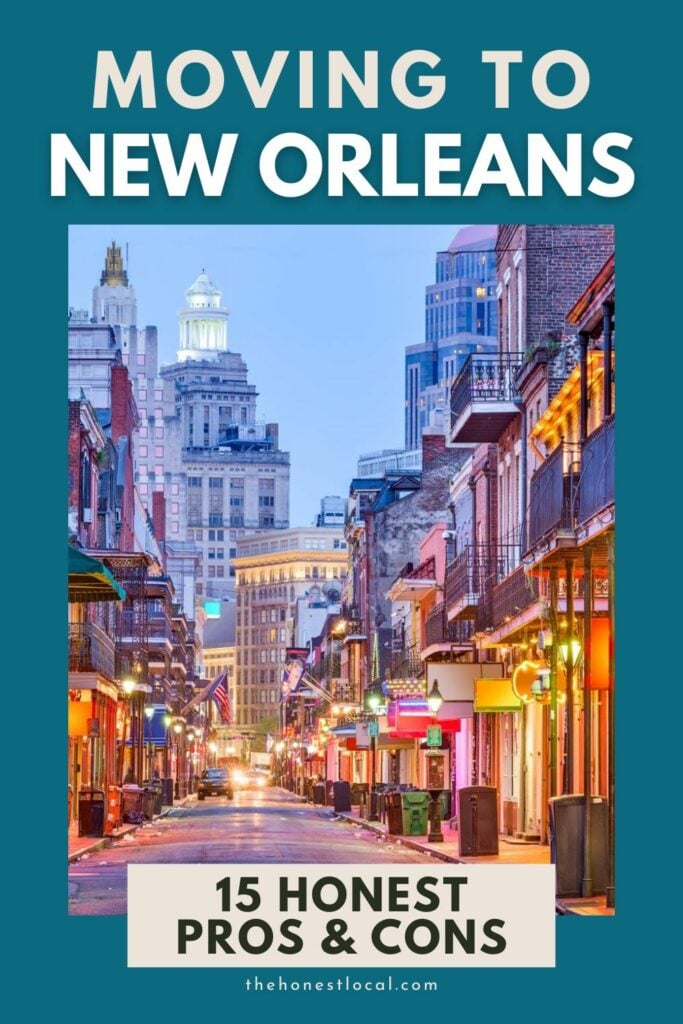
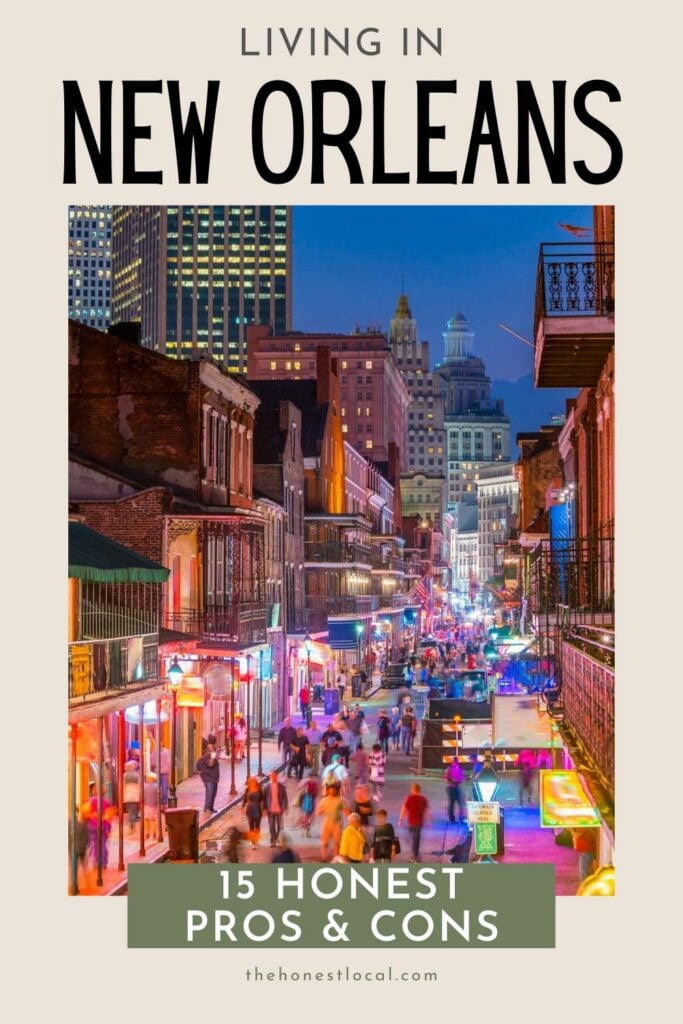
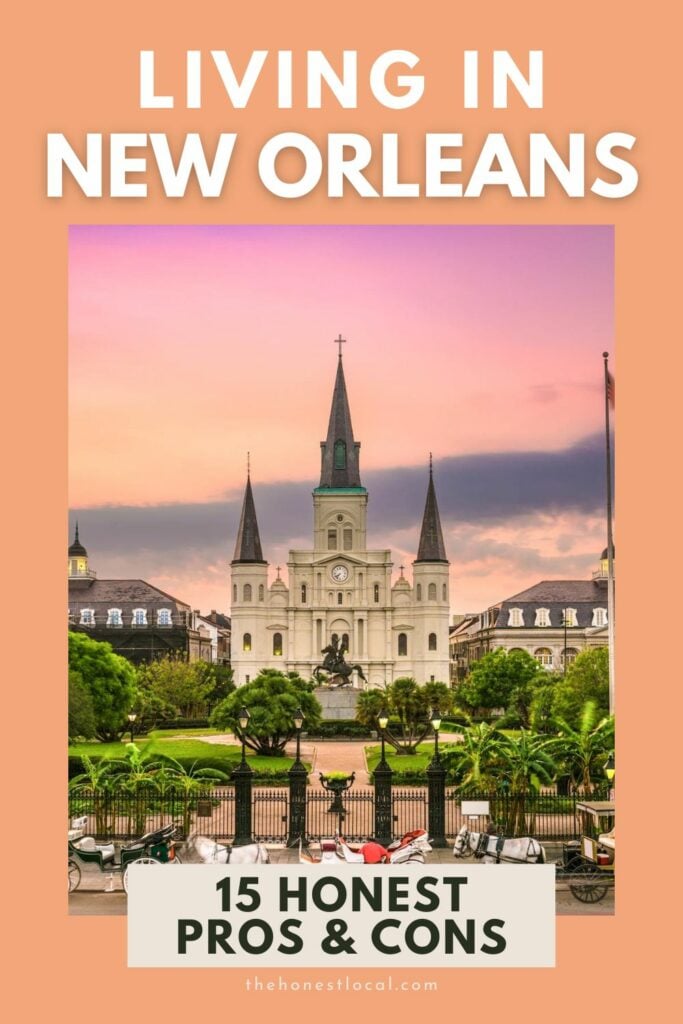
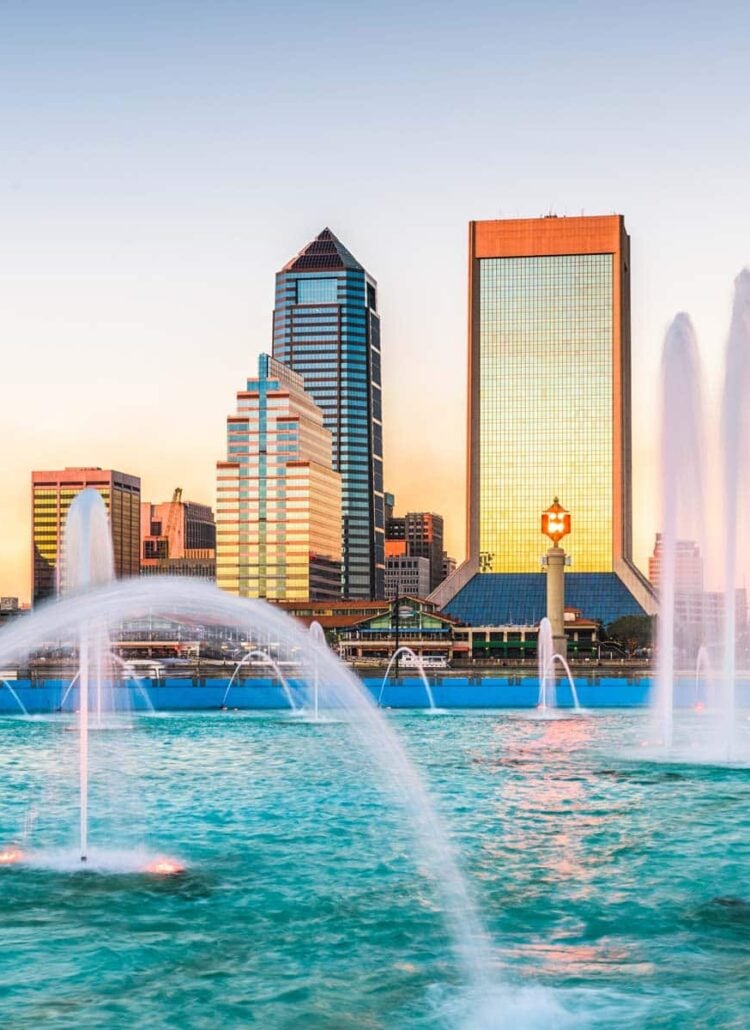
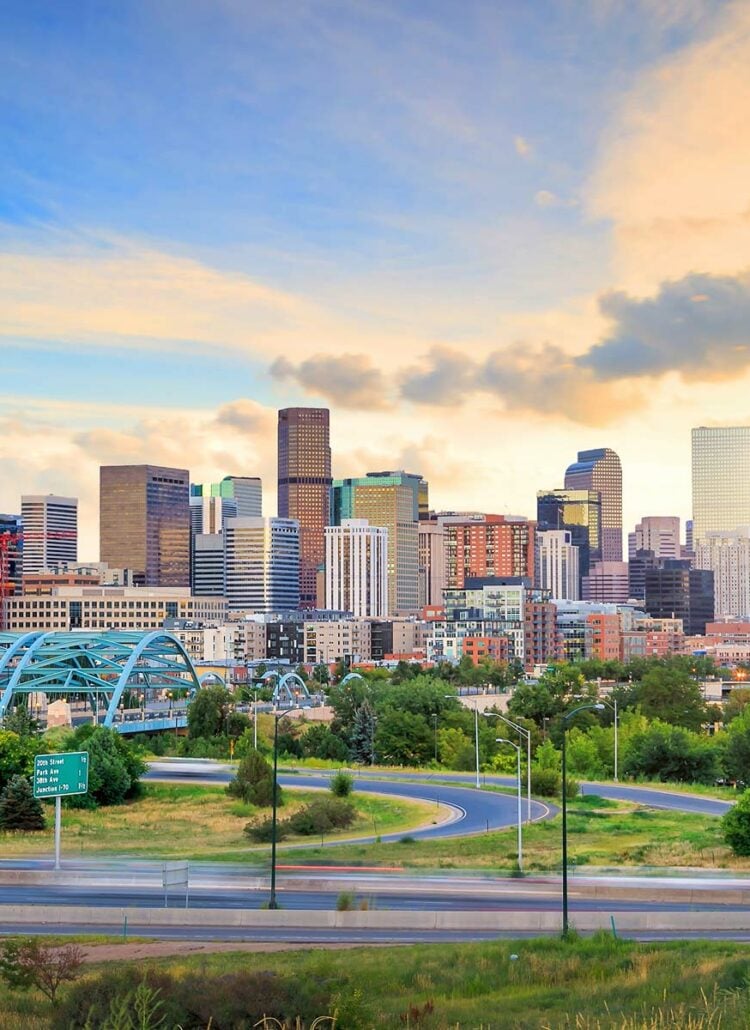
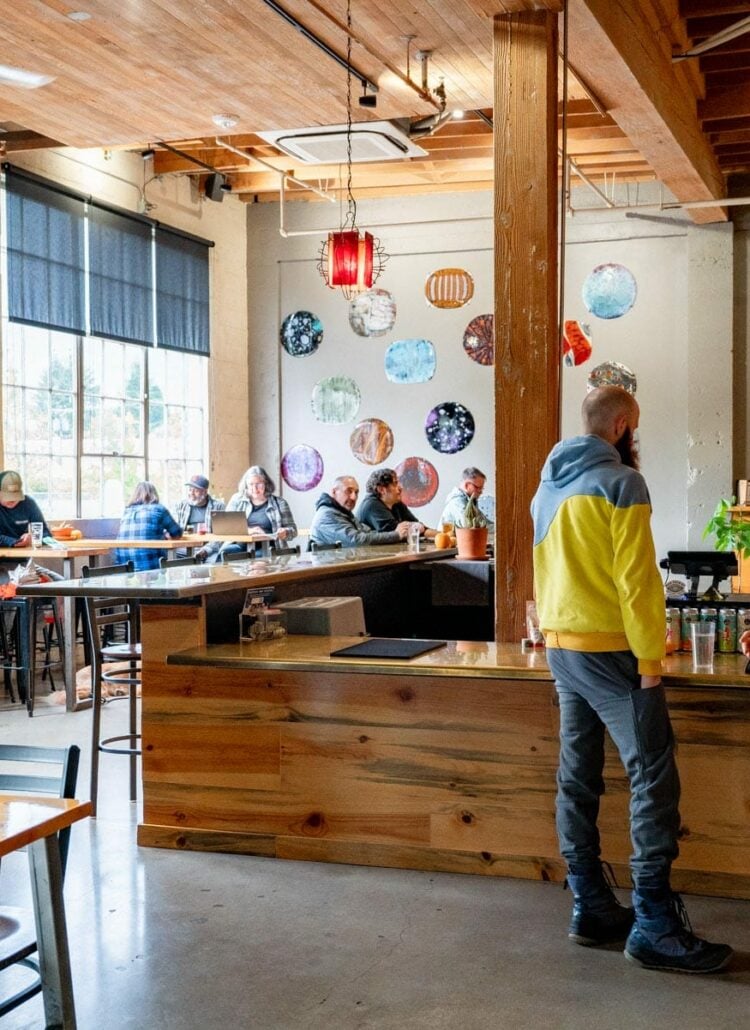
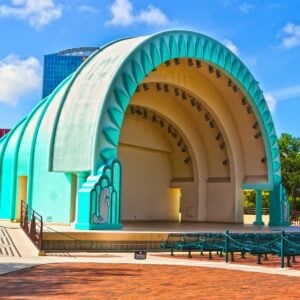

I want to move to New Orleans, but in order to be considered for a job in New Orleans you need to be living in New Orleans. I have applied to several companies, but no response. With that said, what is the best way to land a job in New Orleans if you are out of state? How much would a single person need to save before moving to New Orleans in order to be comfortable until said person lands a job (which could be several months).
This article hit the nail on the head! Definitely budget for private school education if you have kids. My husband and I have 2 kids, both attend private school here and the experience has been great. The public school system is a disaster. On the flip side- the food, culture, and overall vibe of New Orleans is unmatched! And yes we love our Friday’s. Cheers to NOLA!
Thanks for the article. My 18 year old son is moving to New Orleans in the next month or so. Do you have any recommendations on FB groups to join to look for rentals? He intends to work in the restaurant industry until he gets his commercial boating license.
Thank you for this! I have become entirely obsessed with New Orleans after visiting for a total of four weeks last year and I am planning to move there later this year. I know it will be challenging to do alone given all the things that can/will go wrong but I just feel so happy there. I do not drink anymore, but love food, history, music and culture. I appreciate your honest write-up so much…I think the biggest “cons” for me are considering whether to even bring my precious 4Runner, and the bugs! I have worked in the service industry all my life so I think that’s where I’ll begin as far as work. Thank you again, so glad I found this page 🙂
I moved to New Orleans for residency. My wife and I both love the culture and endless list of things to do! To your point, this is definitely a party town but for us (we’re in our 30s) it’s such a fun place to live.
Thank you for this thorough write up. Like you, I ended up moving to New Orleans for a job and have lived here since 2009. The slow way of life surprised me the most. I didn’t even consider myself a fast paced type of person but after moving to New Orleans I definitely felt less inclined to rush.
Overall I still enjoy living in New Orleans but the houses are crumbling and cost of living is going up. Do I see myself in New Orleans for another 10 years? I’m not sure. Maybe five more years before moving on. Anyways, thanks again, this was a good read.